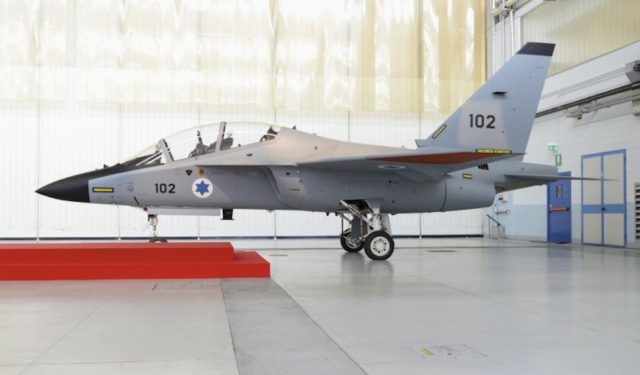Israel
After 49 years, Israel and Guinea signed an agreement on July 20, restoring ties between the Jewish State and Muslim majority nation. The deal marks Israel’s growing diplomatic status among African nations, and comes after Israeli Prime Minister Benjamin Netanyahu’s African tour in early July.
The IDF has included lessons on Hezbollah’s fighting doctrine into infantry training, a measure to better prepare soldiers for a future conflict with the terrorist group based in Lebanon. The program seeks to restructure the IDF’s operational abilities with simulated training exercises in enclosed and urban areas. Senior military officials consider this practice to be more realistic than open air battle.
The last of 30 M-346 jet trainers ordered from Italy landed at the Hatzerim Air Force Base. The planes were first ordered in 2012 and began functioning as Israel’s advanced jet trainer in mid-2015.
Israeli Military Technology
Defense company Elbit Systems released Light SPEAR, a self protection jamming system intended for combat drones operating hostile areas. The defensive system is also designed to gather intelligence data.
Rafael System’s newly designed Spice 1000 munition bomb is almost ready for operational deployment in the Israeli Air Force. The advanced munition is camera operated, has the longest range in its class, and includes software that adapts the bomb to specific target types. Spice 1000 also offers efficiency improvements, reducing the time needed to add and remove the weapon from a fighter jet.
The Israeli Air Force successfully conducted a test flight of an upgraded Hercules aircraft on July 17, testing the plane’s operational ability in numerous modes and conditions. Upgraded C-130H are designed to improve navigation precision, as well as extend the aircraft’s lifespan.
Israel Aerospace Industries (IAI) and U.S.-based Honeywell will work together to develop collision avoidance maneuvering skills for IAI’s Heron drones. Using Honeywell algorithms, IAI will develop a sensor to track and re-route drones in the airspace, with testing dates tentatively set for early 2018.
Israeli Arms Sales
IAI delivered its 10th F-35 Joint Strike fighter wing set to Lockheed Martin on July 12th. The company is preparing to send 18 wing sets to Fort Worth, TX for final assembly before the end of this year. In total IAI will produce 811 wing sets for the F-35A, a deal worth about $2 billion.
Elbit Systems will provide Uruguay with security cameras as part of a $19 million contract with the South American nation. One-thousand cameras and additional equipment will provide officials with real-time data, allowing for reduced response times.
As part of a $30 million contact, Elbit Systems will provide an unnamed European nation with long-view thermal imaging observation systems. The system allows for intelligence and surveillance data gathering in a multitude of conditions. Elbit expects to finish the project within a year.
U.S. Arms Sales
After two years of delay, Republicans are pressing President Obama to move forward with an arms sale to Bahrain, Kuwait, and Qatar. Sales originally came to a halt when questions arose over America’s ability to uphold Israel’s Qualitative Military Edge (QME) with the sale of fighter jets to the three countries. Republican lawmakers say there is no link between the sale and diminishing Israel’s QME, and added that the fighter jets are crucial in the fight against ISIS.
Regional Developments
The State Department greenlighted an arms sale to the UAE on July 15th, worth an estimated $785 million. The potential sale provides bombs, guidance kits and support services for the UAE, an important member in the coalition against ISIS.
Two U.S. missile destroyers took part in a joint maritime security exercise with the French Navy on July 2nd in the Red Sea, specifically to combat piracy and smuggling in order to promote safer waters. The USS Mason and USS Roosevelt worked closely with French destroyer ships during the successful Maritime Security Operation, which are conducted to promote economic stability in the region.
Jewish Policy Center interns Mina Hamblet and Eliana Amundson compiled this report.






